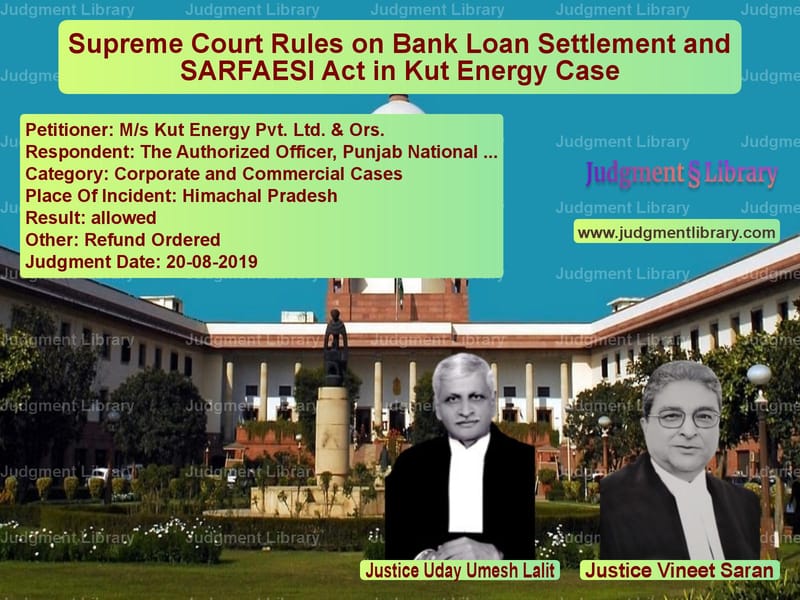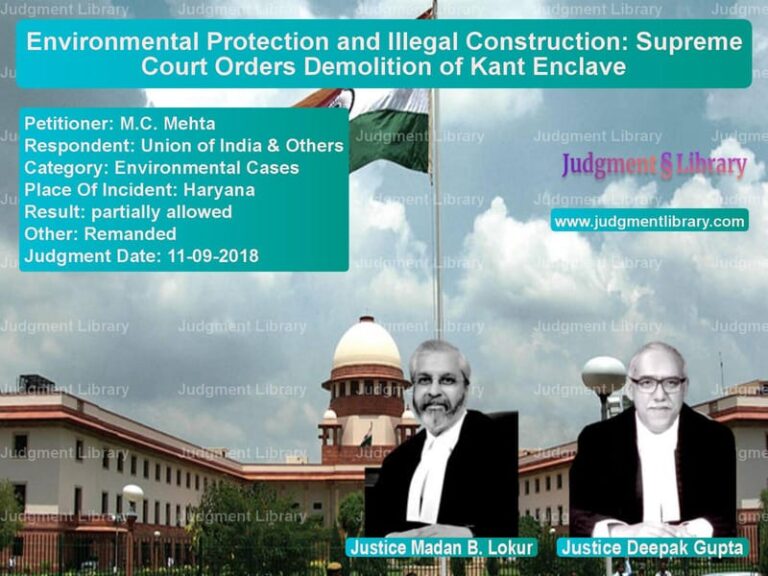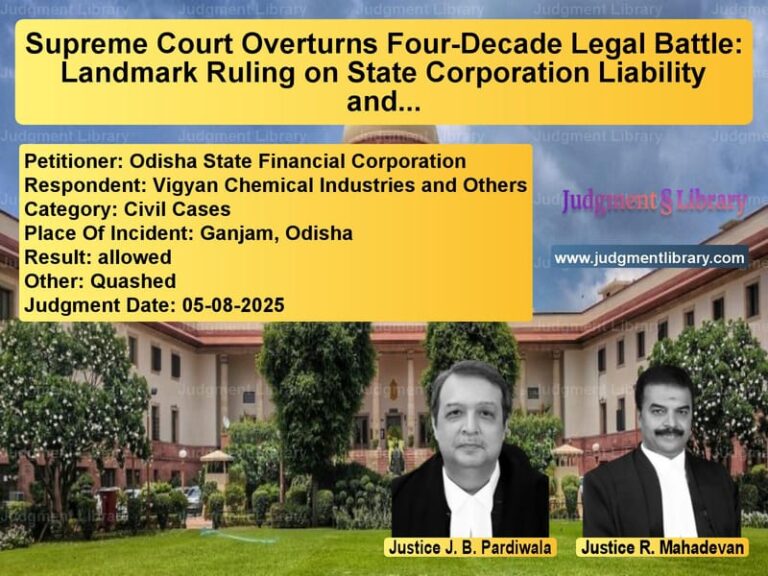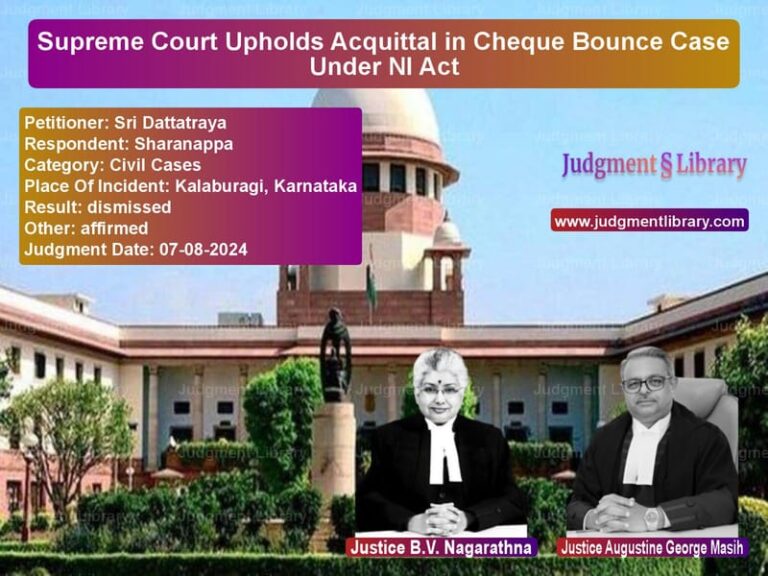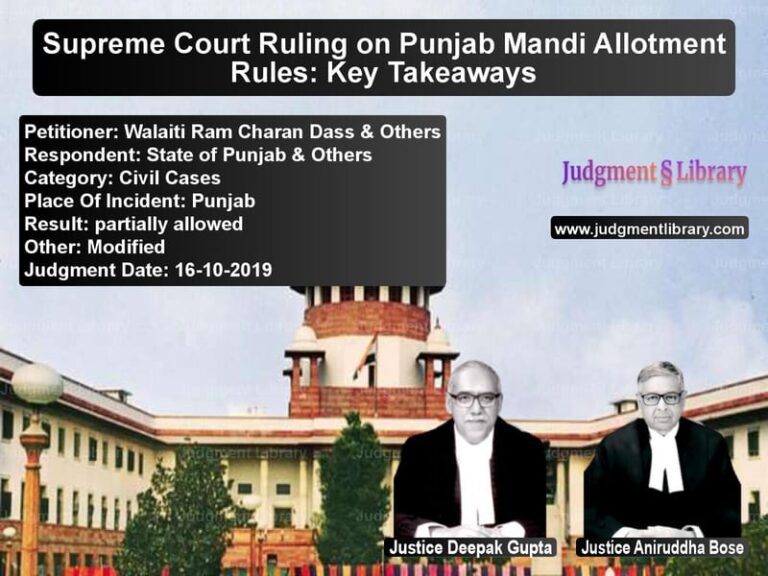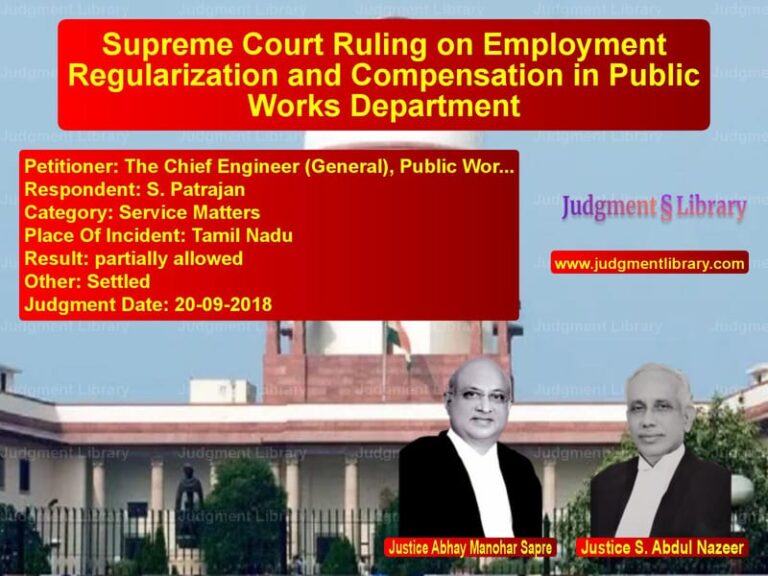Supreme Court Rules on Bank Loan Settlement and SARFAESI Act in Kut Energy Case
The case of M/s Kut Energy Pvt. Ltd. & Ors. vs. The Authorized Officer, Punjab National Bank, Large Corporate Branch, Ludhiana & Ors. revolves around a financial dispute concerning the settlement of a non-performing asset (NPA) loan under the Securitisation and Reconstruction of Financial Assets and Enforcement of Security Interest (SARFAESI) Act, 2002. The Supreme Court, in its judgment dated 20th August 2019, ruled in favor of the appellant company, directing the return of Rs. 40 crores deposited in a bank during the loan settlement negotiations.
Background of the Case
M/s Kut Energy Pvt. Ltd. entered into an agreement with the Government of Himachal Pradesh on 26th May 2008 to set up a 24 MW hydroelectric project in District Shimla. To finance the project, the company availed a loan from a consortium of banks, including Punjab National Bank, Corporation Bank, and Central Bank of India. However, due to financial difficulties, the company’s account was declared a Non-Performing Asset (NPA) on 29th September 2015.
The bank subsequently issued a demand notice under Section 13(2) of the SARFAESI Act on 15th March 2017, demanding repayment of Rs. 106,07,91,644.26 (approximately Rs. 106 crores). Despite multiple settlement proposals by the company, the bank proceeded with an e-auction of the project’s assets.
Key Issues in Dispute
- Whether the bank had the authority to proceed with the auction despite ongoing negotiations.
- Whether the deposit of Rs. 40 crores by the company should be refunded after its settlement proposal was rejected.
- Whether the High Court had the jurisdiction to interfere in the bank’s auction process.
Arguments by the Petitioner (Kut Energy Pvt. Ltd.)
- The company had proposed multiple One Time Settlement (OTS) offers, including an offer of Rs. 140 crores, but the bank rejected them without proper consideration.
- The Rs. 40 crores was deposited in compliance with a High Court order to show the company’s bona fide intention to settle the debt.
- Since the settlement proposal was rejected, the amount deposited should be returned.
- The bank acted in bad faith by proceeding with the e-auction while negotiations were ongoing.
Arguments by the Respondents (Punjab National Bank & Others)
- The bank had followed due process under the SARFAESI Act and declared the borrower an NPA after repeated defaults.
- The company’s deposit of Rs. 40 crores was a voluntary act and should be adjusted against outstanding dues.
- The High Court’s interference in the matter was unwarranted as alternative legal remedies were available to the borrower under the Debt Recovery Tribunal (DRT).
- The e-auction was conducted lawfully, and a third party had successfully bid for the project assets.
Supreme Court’s Observations
1. Validity of the Loan Settlement Process
The Court recognized that the company had made genuine efforts to settle its dues. However, it noted:
“The bank has the discretion to accept or reject settlement proposals, but it must do so in a fair and transparent manner.”
2. Appropriateness of the High Court’s Order
The Supreme Court ruled that the High Court should not have interfered in the bank’s decision-making process under the SARFAESI Act.
“The High Court ought not to have interfered in such matters in the writ jurisdiction, especially when the borrower had alternative remedies under the DRT.”
3. Refund of Rs. 40 Crores
The Court found that the Rs. 40 crores was deposited solely to show the company’s bona fides in the settlement negotiations. Since the settlement proposal was ultimately rejected, the Court ruled:
“The deposit was not towards the repayment of the loan but a condition imposed by the High Court. The amount must be returned to the borrower.”
Final Verdict
- The Supreme Court set aside the High Court’s ruling.
- The amount of Rs. 40 crores was ordered to be returned to Kut Energy Pvt. Ltd. within two weeks.
- The Court upheld the validity of the SARFAESI proceedings but ruled that the bank must act fairly in loan settlements.
Implications of the Judgment
- Reaffirms the limited scope of judicial interference in SARFAESI matters.
- Ensures that borrowers are not unfairly penalized for deposits made in good faith.
- Reinforces the principle that banks must consider OTS proposals in a fair and transparent manner.
- Encourages companies to seek proper remedies through DRT rather than relying on High Court interventions.
Conclusion
The Supreme Court’s ruling in this case clarifies the rights of borrowers and lenders in the SARFAESI framework. While banks have the authority to recover debts through auctions, they must act fairly when considering settlement offers. The judgment also protects borrowers from losing deposits made in good faith during negotiations. This case serves as a crucial precedent in banking and financial disputes, reinforcing the principle that commercial settlements must be handled with fairness and due process.
Petitioner Name: M/s Kut Energy Pvt. Ltd. & Ors..Respondent Name: The Authorized Officer, Punjab National Bank, Large Corporate Branch, Ludhiana & Ors..Judgment By: Justice Uday Umesh Lalit, Justice Vineet Saran.Place Of Incident: Himachal Pradesh.Judgment Date: 20-08-2019.
Don’t miss out on the full details! Download the complete judgment in PDF format below and gain valuable insights instantly!
Download Judgment: Ms Kut Energy Pvt. vs The Authorized Offic Supreme Court of India Judgment Dated 20-08-2019.pdf
Direct Downlaod Judgment: Direct downlaod this Judgment
See all petitions in Bankruptcy and Insolvency
See all petitions in Judgment by Uday Umesh Lalit
See all petitions in Judgment by Vineet Saran
See all petitions in allowed
See all petitions in Refund Ordered
See all petitions in supreme court of India judgments August 2019
See all petitions in 2019 judgments
See all posts in Corporate and Commercial Cases Category
See all allowed petitions in Corporate and Commercial Cases Category
See all Dismissed petitions in Corporate and Commercial Cases Category
See all partially allowed petitions in Corporate and Commercial Cases Category

